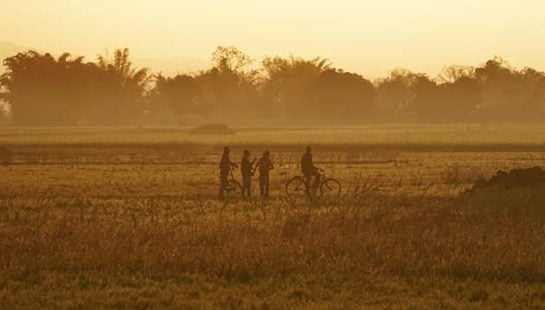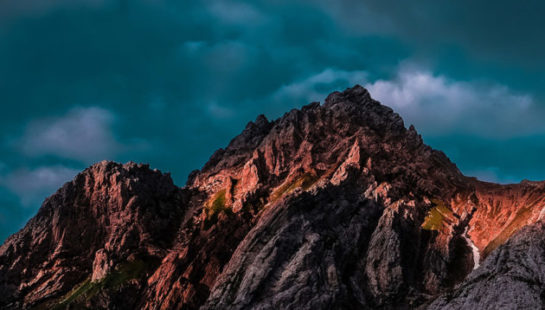Years ago, I heard a professor explain how beauty brings justice into the world. Imagine watching a magnificent sunset, she said, or hearing a glorious piece of music. What do you want to do in those moments, she asked? What’s your first instinct to such loveliness?
Yes, you want to grab someone and share the experience.
After all, she continued, a great work of beauty pulls us out of our self-absorption and into a place of equality, of mutuality, of, well, justice.
I’ve thought of her insight many times since. Like the time I saw dolphins as I walked the beach and couldn’t help but point them out to strangers walking by. To share it and marvel together.
Or the time most recently when I was moved to tears (in a good way) researching and writing about a farmer named Judy, her life made even more beautiful through the just efforts of Christian Partners in Kenya. It’s a story I loved sharing.
Beauty draws us out of ourselves and into thinking of others. It plants us firmly in a moment of true equity, standing together as equals in awe of some beautiful thing.
The Poetry Of Justice
I saw this again as I revisited the poetry of Isaiah 58. The chapter is considered one of the most literary pieces of Scripture. Yet its power comes not in the poetic rhythms, lovely as they are, but in the descriptions that call a people from hollow religion into a radical justice, God’s justice.
Though it was written some 600 years before Jesus, Isaiah 58 speaks to us today as we navigate a culture where beauty is often confused with appearance and justice is in short supply, especially for those most vulnerable.
Though it was written some 600 years before Jesus, Isaiah 58 speaks to us today as we navigate a culture where beauty is often confused with appearance and justice is in short supply, especially for those most vulnerable.
The first three verses show a people proud of their religious duties yet perplexed that God hasn’t been impressed. Then God responds: ‘“Yet on the day of your fasting, you do as you please and exploit all your workers. Your fasting ends in quarrelling and strife, and in striking each other with wicked fists. You cannot fast as you do today and expect your voice to be heard on high.”’
In other words, exploiting workers is ugly stuff (and why we help companies work for their good with the Ethical Fashion Report). Quarrelling, violence and strife—i.e. selfish behaviour—also falls into that category of plain ugly.
When we don’t see beauty in how people are treated or when institutions care more about profits than justice, Isaiah says we’re to take notice, because God certainly does. If we see workers unfairly paid or people without homes, we’re alerted to a lack of justice. Injustice is hideous, arrogant and alarming; it ignores the dignity of God’s creation in each person and assumes a pretence that some are better than others.
The Contrast Of Ugly
Justice, though, has a different posture. Isaiah spells it out in the next verses when God calls his people to ‘bow one’s head like a reed’. It’s the start of recognizing we are not above any other human being.
Then we get specific marching orders: ‘“Is not this the kind of fasting I have chosen: to loose the chains of injustice and untie the cords of the yoke, to set the oppressed free and break every yoke? Is it not to share your food with the hungry and to provide the poor wanderer with shelter—when you see the naked, to clothe them, and not to turn away from your own flesh and blood?”’
Sharing our food with the hungry, setting the oppressed free, providing for the poor wanderer, all mean we put ourselves on equal footing with those in need. What’s mine is yours. It’s loving our neighbours as our selves.
And it’s beautiful. Because what happens when we do? Verses 11, 12 paint the picture: ‘The Lord will guide you always; he will satisfy your needs in a sun-scorched land and will strengthen your frame. You will be like a well-watered garden, like a spring whose waters never fail. Your people will rebuild the ancient ruins and will raise up the age-old foundations; you will be called Repairer of Broken Walls, Restorer of Streets with Dwellings.’
A well-watered garden pops in colours, textures and scents. We’re inspired from its beauty to do other creative things, like rebuilding ancient ruins (re-purposing at its best). Yes, we are called to join God in his work as the Restorer of Streets with Dwellings.
The Precedent Of Justice And Beauty
Through the lens of Isaiah 58, we see justice most vividly on the cross, when an innocent man named Jesus was tortured and executed as he took on the world’s injustice. It was excruciatingly ugly, a moment in history filled with misery, chaos and violence.
Injustice is hard to watch.
But it was not the end of the story. We were not left with the ugliness of injustice.
Because the dawn of new life, the well-watered garden, burst into existence with Christ’s resurrection. Still scarred, his aliveness was glorious and as mesmerizing as a spring whose waters never fail.
He continues his work to this day through his new body—the church, you and me—as we become his repairers of ancient streets, his restorers of broken walls.
So, whenever we pursue justice (as we do here at Baptist World Aid), we invite beauty. And when we help to create beauty and flourishing alongside other Christian workers, we watch justice emerge for all.
We hear the melodies of otherwise voiceless people and see the rhythms, gifts and cultures of those too often pushed to the margins. We come alongside them as part of the restoration process, and watch justice transform a once hungry farmer, a family and an entire community.
And it really is a thing of beauty.
This article first appeared on Sight Magazine on 15th June 2022.




 Nick Lloyd,
Nick Lloyd,